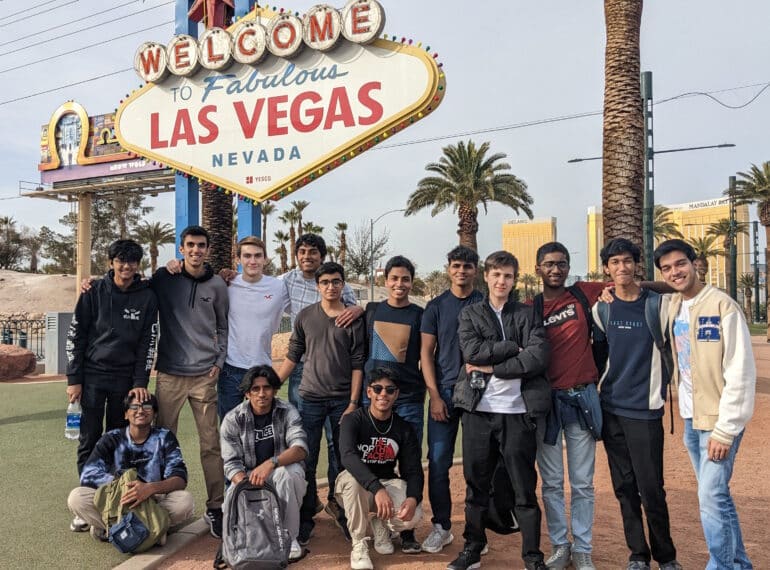
Two Year 12 squads flew the flag for Britain when they fought against more than 100 competing teams in the Battle for Vegas – an inaugural Vex Robotics Signature Event in the desert resort.
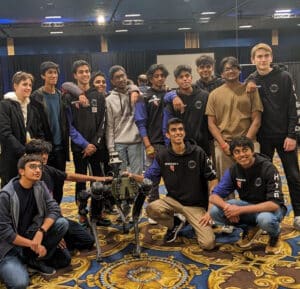 The QE boys, who made up the only teams from outside North America to attend, enjoyed both the competition and the chance to take in Las Vegas’s spectacular attractions.
The QE boys, who made up the only teams from outside North America to attend, enjoyed both the competition and the chance to take in Las Vegas’s spectacular attractions.
QE’s team Tempest finished their first day unbeaten, despite some daunting opposition, while team HYBRID struck up a strong relationship with an American partner team on day 2. In their time off, the sixth-formers revelled in the technical and architectural wonders on, around and even under the city’s glittering streets.
Head of Technology Michael Noonan, who accompanied the boys together with Technology teacher James Howard, explained that since the annual Vex Robotics World Championships in the US fall in the Summer Term, boys in years with public examinations are unable to attend. Instead, their teachers looked into suitable US-based Signature Events, which are events designed to provide competition at a level above that typically experienced at regional competitions. The QE teams, who are sponsored by Kingston Technology, opted for the one based at the Westgate Hotel and Resort in Las Vegas – the venue where, in July 1969, Elvis Presley performed two shows a night, seven days a week.
After their ten-hour flight from Heathrow, the AS students first replenished their strength at the Peppermill Restaurant, made famous as the backdrop of films and TV shows including Casino, The Cotton Club, and CSI: Vegas.
 They then made their way along Vegas’s celebrated Strip. “One highlight in particular was The Venetian – a resort and hotel, which boasts an indoor network of Venice-style canals, complete with singing gondola drivers!” said Mr Noonan. Further down the street, they took in the famous Welcome to Las Vegas sign and marvelled both at the water & light show at the fountain of the Bellagio and at the incredible complexity of the part-roller coaster, part-hotel New York New York attraction. “Racking up close to 30,000 steps over the course of the day was not enough, though, as the pupils made their way to the Area 15 entertainment complex, wondering at many of the audio-visual wonders on offer, and at the surreal Omega Mart [an exhibition billed as ‘an interactive, mind-bending immersive art experience’].”
They then made their way along Vegas’s celebrated Strip. “One highlight in particular was The Venetian – a resort and hotel, which boasts an indoor network of Venice-style canals, complete with singing gondola drivers!” said Mr Noonan. Further down the street, they took in the famous Welcome to Las Vegas sign and marvelled both at the water & light show at the fountain of the Bellagio and at the incredible complexity of the part-roller coaster, part-hotel New York New York attraction. “Racking up close to 30,000 steps over the course of the day was not enough, though, as the pupils made their way to the Area 15 entertainment complex, wondering at many of the audio-visual wonders on offer, and at the surreal Omega Mart [an exhibition billed as ‘an interactive, mind-bending immersive art experience’].”
After an early start the following morning – and a swift present-buying visit to the World’s Largest Gift Shop – the boys began preparations for their first formal day of competition. They started setting up their pit area, fine-tuning their build process and rehearsing their pro-programmed routines.
This day also brought a highly exclusive trip to the cutting-edge loop underground public transport system at the Las Vegas Convention Center created by Elon Musk’s The Boring Company. “The students were able to see state-of-the-art engineering developments, many of which are too secretive to even photograph!” said Mr Noonan.
 After this once-in-a-lifetime opportunity, the boys returned to their robotics, making final preparations for the following day of qualification, as well as taking part in some impromptu practice sessions. “As the only overseas team at the event, the other 100 or so US, Canada and Mexico-based teams were very eager to get to know the QE teams, with lots of potential alliance links formed,” said Mr Noonan. They topped off the day with a visit to the “incredible” High Roller observation wheel at The LINQ Hotel – a 550ft wheel offering breath-taking views over the Strip.
After this once-in-a-lifetime opportunity, the boys returned to their robotics, making final preparations for the following day of qualification, as well as taking part in some impromptu practice sessions. “As the only overseas team at the event, the other 100 or so US, Canada and Mexico-based teams were very eager to get to know the QE teams, with lots of potential alliance links formed,” said Mr Noonan. They topped off the day with a visit to the “incredible” High Roller observation wheel at The LINQ Hotel – a 550ft wheel offering breath-taking views over the Strip.
“On the first day of competition, team Tempest had, in keeping with their name, a storming day, despite their division featuring some of the world’s finest teams. They finished the day with a perfect record of five wins, leaving them ranked fifth in their division of 61 teams.”
Things proved a little tougher for team HYBRID, with last-minute fixes and alterations at times resulting in inconsistent robot performance. “However, they toughed it out and managed to finish the day with a record of three wins and two losses,” said Mr Noonan.
With little time to catch their breath, the teams were then off to Battlebots Arena – a permanent area purpose-built to showcase the highly popular Battlebots television show, yet featuring live robotic action. “They were thrilled to see famed robots from the television series, including Witch Doctor, Kraken, Mammoth, HyperShock and Whiplash. At the end of the event, they took photos with some of the engineers and team representatives, gaining an insight into the lives of professional robotic engineers.”
 After their disappointments on day 1, team HYBRID began day 2 still determined to finish in the automatic alliance spots in their division. “They succeeded in doing so, finishing the qualification section ranked 21st, and allying with team 3303S Dublin Robotics from Dublin, California,” said Mr Noonan. “They built up a great relationship with them through collaboration and discussion over the two days and were always likely to pick this team. Sadly, there was further disappointment for them, as they were cruelly denied by disqualification on a technicality in their round-of-16 game.”
After their disappointments on day 1, team HYBRID began day 2 still determined to finish in the automatic alliance spots in their division. “They succeeded in doing so, finishing the qualification section ranked 21st, and allying with team 3303S Dublin Robotics from Dublin, California,” said Mr Noonan. “They built up a great relationship with them through collaboration and discussion over the two days and were always likely to pick this team. Sadly, there was further disappointment for them, as they were cruelly denied by disqualification on a technicality in their round-of-16 game.”
Having remained unbeaten in the early stages of competition, team Tempest did finally succumb to their only loss of the tournament, and finished the day ranked 13th. “They chose Team Fizzy, a former World Championship challenger from Omaha, Nebraska, and were unfortunate not to progress past the round of 16, following a loss caused by robot malfunction.”
The boys took in the overall finals, witnessing the “incredible consistency” of the eventual champion teams, Gears from Martinsville, Indiana, and Pink Sparklee Unicorns from Woodbridge, Virginia. “They managed to grab a photo with the champion teams – gaining some essential advice on how to continue to improve.”
As they got ready for their return flight, the QE teams were visibly exhausted, but were already planning that, after a short break, they would be preparing to go into battle once again, their sights set on a first QE VEX Robotics Championship win in three years, Mr Noonan said.
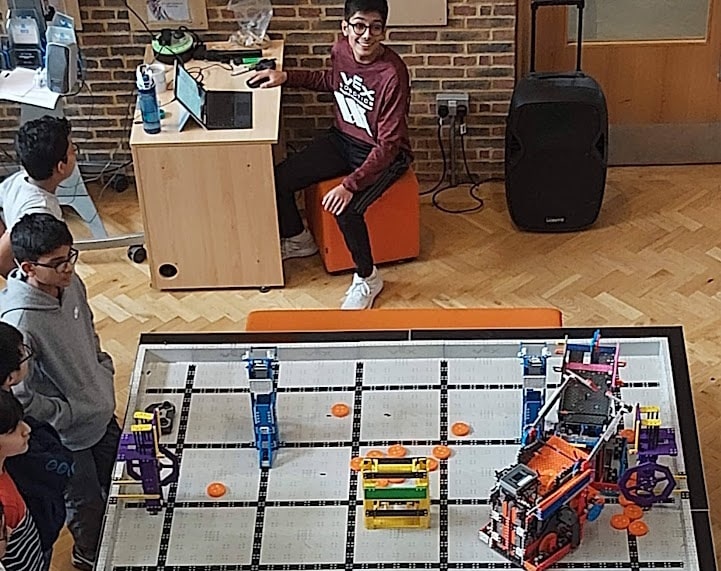
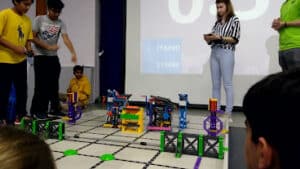 Having already achieved significant successes in recent years at in-person regional, national and international Vex championships – including a world title in 2018 – QE’s robotics teams have recently added online competitions to their repertoire.
Having already achieved significant successes in recent years at in-person regional, national and international Vex championships – including a world title in 2018 – QE’s robotics teams have recently added online competitions to their repertoire.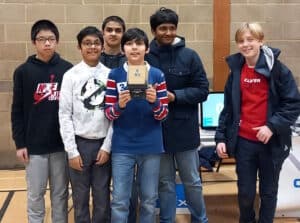 One VRC squad – team number 20785X – was named winner of both the Theme It Up! Challenge and the Community Challenge, as well as being a runner-up in the Career Readiness Challenge. Another, 20785C, took two runner-up spots.
One VRC squad – team number 20785X – was named winner of both the Theme It Up! Challenge and the Community Challenge, as well as being a runner-up in the Career Readiness Challenge. Another, 20785C, took two runner-up spots.

 The QE boys, who made up the only teams from outside North America to attend, enjoyed both the competition and the chance to take in Las Vegas’s spectacular attractions.
The QE boys, who made up the only teams from outside North America to attend, enjoyed both the competition and the chance to take in Las Vegas’s spectacular attractions. They then made their way along Vegas’s celebrated Strip. “One highlight in particular was The Venetian – a resort and hotel, which boasts an indoor network of Venice-style canals, complete with singing gondola drivers!” said Mr Noonan. Further down the street, they took in the famous Welcome to Las Vegas sign and marvelled both at the water & light show at the fountain of the Bellagio and at the incredible complexity of the part-roller coaster, part-hotel New York New York attraction. “Racking up close to 30,000 steps over the course of the day was not enough, though, as the pupils made their way to the Area 15 entertainment complex, wondering at many of the audio-visual wonders on offer, and at the surreal Omega Mart [an exhibition billed as ‘an interactive, mind-bending immersive art experience’].”
They then made their way along Vegas’s celebrated Strip. “One highlight in particular was The Venetian – a resort and hotel, which boasts an indoor network of Venice-style canals, complete with singing gondola drivers!” said Mr Noonan. Further down the street, they took in the famous Welcome to Las Vegas sign and marvelled both at the water & light show at the fountain of the Bellagio and at the incredible complexity of the part-roller coaster, part-hotel New York New York attraction. “Racking up close to 30,000 steps over the course of the day was not enough, though, as the pupils made their way to the Area 15 entertainment complex, wondering at many of the audio-visual wonders on offer, and at the surreal Omega Mart [an exhibition billed as ‘an interactive, mind-bending immersive art experience’].” After this once-in-a-lifetime opportunity, the boys returned to their robotics, making final preparations for the following day of qualification, as well as taking part in some impromptu practice sessions. “As the only overseas team at the event, the other 100 or so US, Canada and Mexico-based teams were very eager to get to know the QE teams, with lots of potential alliance links formed,” said Mr Noonan. They topped off the day with a visit to the “incredible” High Roller observation wheel at The LINQ Hotel – a 550ft wheel offering breath-taking views over the Strip.
After this once-in-a-lifetime opportunity, the boys returned to their robotics, making final preparations for the following day of qualification, as well as taking part in some impromptu practice sessions. “As the only overseas team at the event, the other 100 or so US, Canada and Mexico-based teams were very eager to get to know the QE teams, with lots of potential alliance links formed,” said Mr Noonan. They topped off the day with a visit to the “incredible” High Roller observation wheel at The LINQ Hotel – a 550ft wheel offering breath-taking views over the Strip. After their disappointments on day 1, team HYBRID began day 2 still determined to finish in the automatic alliance spots in their division. “They succeeded in doing so, finishing the qualification section ranked 21st, and allying with team 3303S Dublin Robotics from Dublin, California,” said Mr Noonan. “They built up a great relationship with them through collaboration and discussion over the two days and were always likely to pick this team. Sadly, there was further disappointment for them, as they were cruelly denied by disqualification on a technicality in their round-of-16 game.”
After their disappointments on day 1, team HYBRID began day 2 still determined to finish in the automatic alliance spots in their division. “They succeeded in doing so, finishing the qualification section ranked 21st, and allying with team 3303S Dublin Robotics from Dublin, California,” said Mr Noonan. “They built up a great relationship with them through collaboration and discussion over the two days and were always likely to pick this team. Sadly, there was further disappointment for them, as they were cruelly denied by disqualification on a technicality in their round-of-16 game.”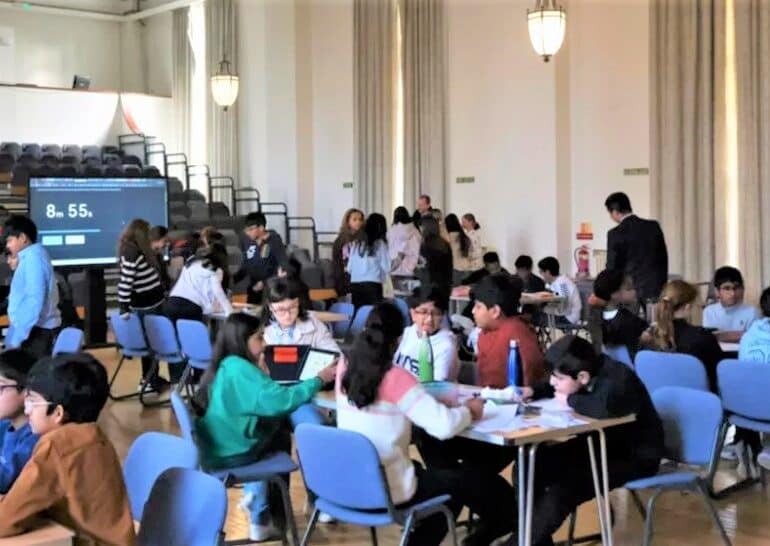
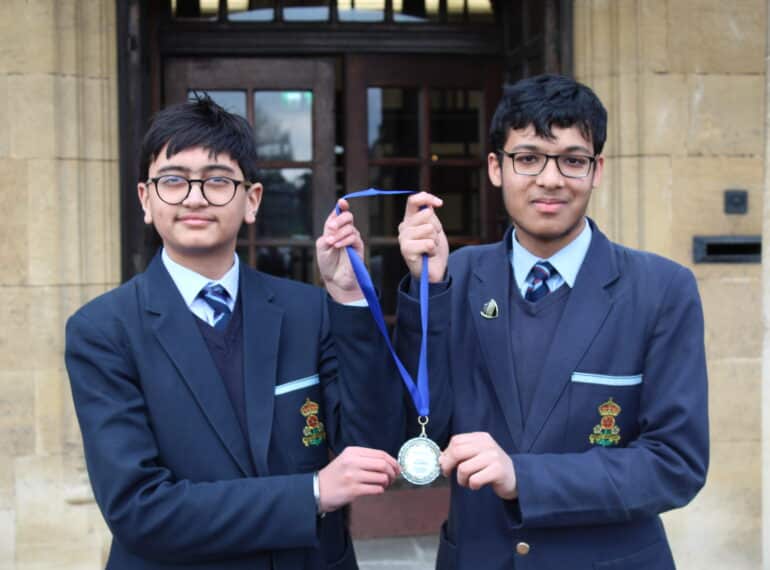
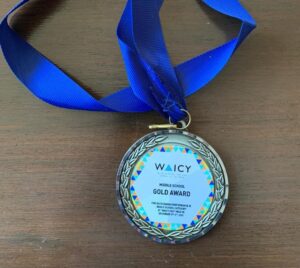 Paarth and Nittant won their medals and certificate for “outstanding performance”. Their project was designed to detect objects that are typically the subject of fly-tipping. They aimed to reduce the deleterious impact of fly-tipping on the environment and to help local authorities optimise their resources so that they can plan better and clean up more effectively.
Paarth and Nittant won their medals and certificate for “outstanding performance”. Their project was designed to detect objects that are typically the subject of fly-tipping. They aimed to reduce the deleterious impact of fly-tipping on the environment and to help local authorities optimise their resources so that they can plan better and clean up more effectively.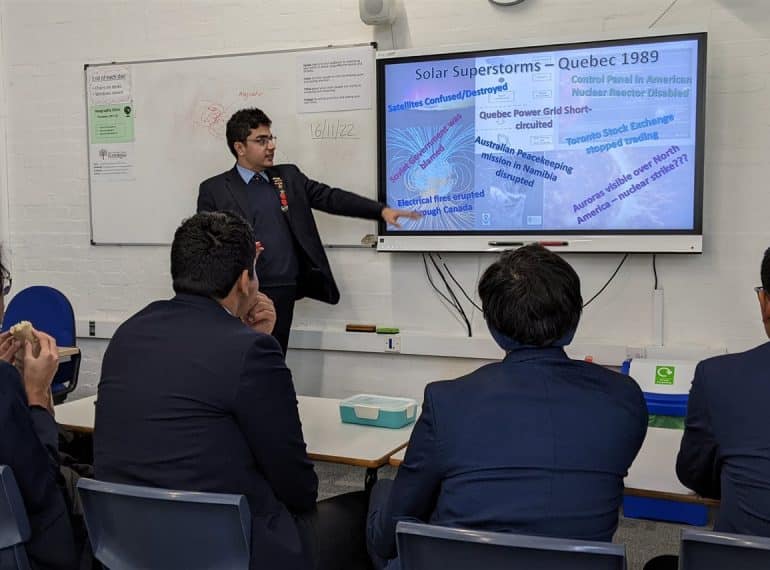
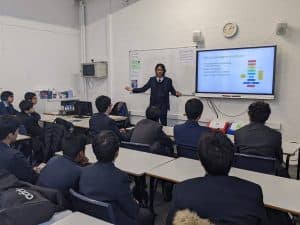 Among them is Year 11’s Chanakya Seetharam, pictured right, who gave a presentation on Geography through a Marxist lens. He said: “As a keen geographer, I have never been particularly given to the perception of Geography as somehow a ‘soft’ subject. The club provides an indisputably rigorous and academic forum, in which to discuss topical geographical issues.”
Among them is Year 11’s Chanakya Seetharam, pictured right, who gave a presentation on Geography through a Marxist lens. He said: “As a keen geographer, I have never been particularly given to the perception of Geography as somehow a ‘soft’ subject. The club provides an indisputably rigorous and academic forum, in which to discuss topical geographical issues.”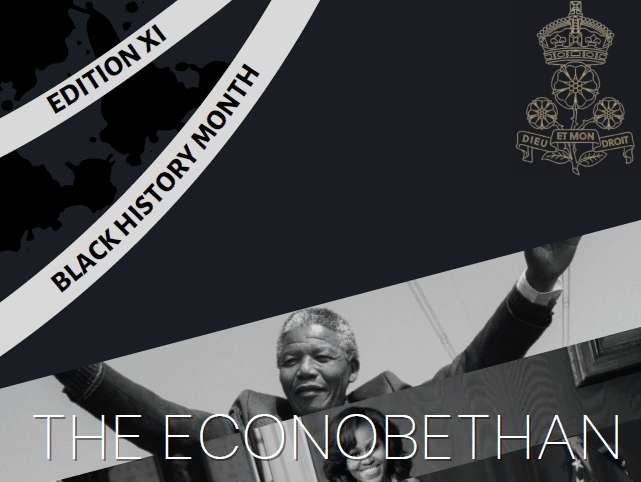
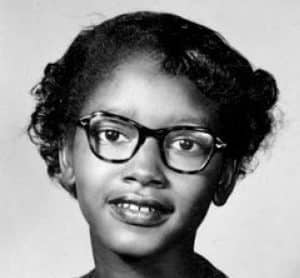 “The theme of Black history is timely: through the launch of our long-term vision for a broad, diverse and inclusive curriculum, we seek to build on the very thoughtful work that has already been done at the School, ensuring that our pupils are well-equipped to thrive in our diverse, modern world.”
“The theme of Black history is timely: through the launch of our long-term vision for a broad, diverse and inclusive curriculum, we seek to build on the very thoughtful work that has already been done at the School, ensuring that our pupils are well-equipped to thrive in our diverse, modern world.”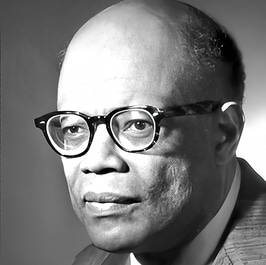 Aston Daniel looks in more detail at the work of Sir Arthur, while a piece from Avinash is entitled How Does Systemic Racism Continue to Impact Economic Outcomes for African Americans? and Keith Correia writes on How was the war on drugs in the US used as a segregation tool?
Aston Daniel looks in more detail at the work of Sir Arthur, while a piece from Avinash is entitled How Does Systemic Racism Continue to Impact Economic Outcomes for African Americans? and Keith Correia writes on How was the war on drugs in the US used as a segregation tool?